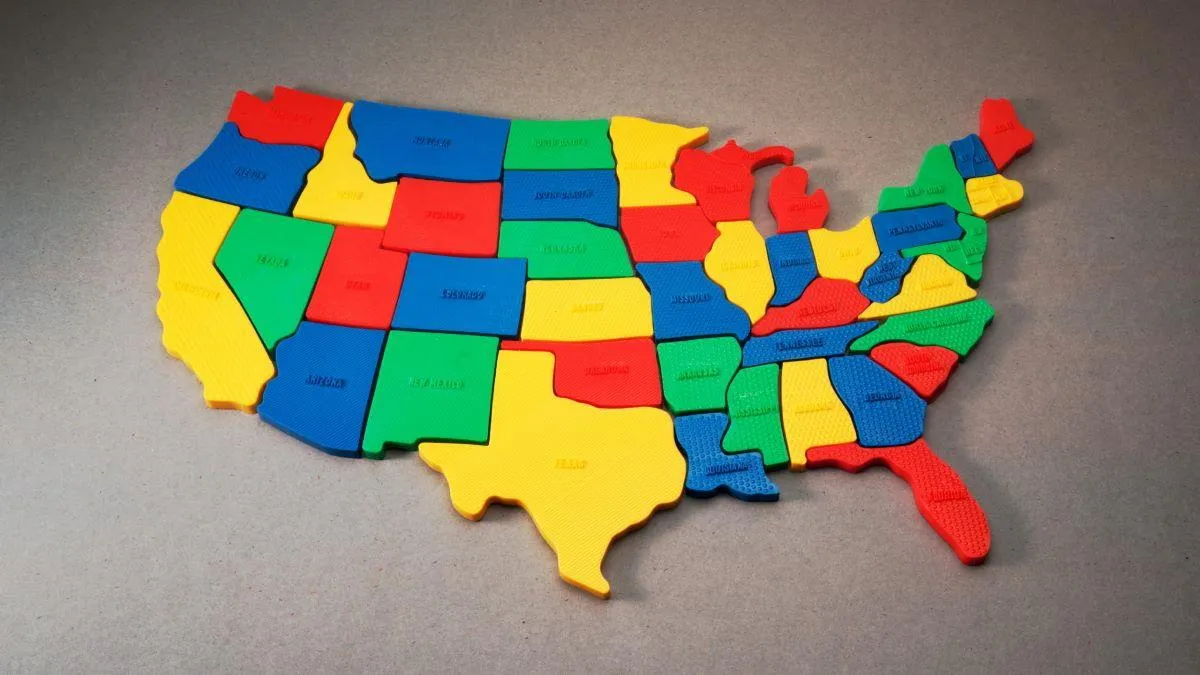For hundreds of years, they have been known as the United States of America, but when it comes to tax, the country is neither united, nor made up of 50 states…
*Boring legal interlude*
In the US, federal law is the body of law created by the federal government for the whole country. State law is the law of each separate state, as passed by the state legislature and adjudicated by state courts. It exists in parallel, and sometimes in conflict with, US federal law.
Sales tax is not governed at the federal level, which means each state can do what it wants in this regard. Currently, 46 states and the District of Columbia have decided to impose a sales tax legislation (or something that walks and talks exactly like it). There are 4 states that don’t charge any form of sales tax (Delaware, Montana, New Hampshire and Oregon), so you don’t have to worry about these. Unfortunately, the other 47 need to be considered individually when determining your tax obligations.
Understanding Nexus
Nexus is a legal term that refers to the connection or link between a business and a state that obligates the business to collect and remit sales tax in that state. It essentially determines whether a seller has a tax obligation based on their activities within a particular jurisdiction.
As an eCommerce seller, there are two main questions to ask in each of these states:
- Do I have a physical presence that creates a tax obligation? (see physical nexus)
- Do my sales volumes or revenues create a tax obligation? (see economic nexus)
Answering those questions is not simple because each state has a different definition of physical nexus and each has a different way of calculating economic nexus. But even after you have solved those 47 mysteries, you are in for a whole new world of pain…Each state not only determines the rules for registering, but they have a trillion different options for what products need to be taxed, how much tax to charge and how to report this to the state tax office.
Chocolate bars may be a “taxable product” in California, but Utah could exempt them. And even if candy is taxable in Cali, what rate applies? Well, if you deliver it to LA, the rate might be 9.5%, but five hours down the Interstate freeway in San Fran, the same product would be closer to 10%.
Why Is Nexus Important For eCommerce Sellers
- Tax compliance: Understanding nexus is crucial for eCommerce sellers because it determines whether they must collect sales tax from customers in a particular state. If a seller has nexus in a state, they are required to register for a sales tax permit, collect the appropriate sales tax, and remit it to the state tax authorities.
- Avoiding penalties: Failure to comply with sales tax laws can result in significant penalties, interest on unpaid taxes, and potential audits. Knowing where nexus exists helps sellers avoid costly mistakes.
- Market expansion: For sellers looking to expand into new states, understanding nexus is essential. They need to be aware of their tax obligations before entering new markets to ensure compliance and avoid unexpected tax liabilities.
- Financial planning: Sales tax compliance can impact pricing strategies and overall profitability. Sellers need to factor in sales tax when calculating costs and setting prices, especially if they operate in multiple states with varying rates and regulations.
- Evolving regulations: Sales tax laws are constantly changing, particularly in response to the growth of eCommerce. Sellers must stay informed about these changes and how they may affect their nexus status and tax obligations.
eCommerce Economic Nexus Rules
All states apply physical nexus requirements, meaning that if a seller has a physical presence—such as a store, warehouse, or employees—in a state, they are obligated to collect sales tax on sales made to customers in that state.
Additionally, many states have established economic thresholds based on sales volume or transaction count, which can create nexus even without a physical presence
Conclusion
OK, so you have solved that problem? Now, how do you report those sales to the Californian tax authorities? LA might expect you to split your sales up by county so they can share the tax revenue, but San Diego could be happy for all taxes to be reported in the same place.
We know that it’s hard. There are 47 different sets of tax rules to understand and comply with, and even if you could make sense of the complex tax jargon, it is literally impossible to charge the right tax and report it to each state without technology. You’ll need some help.
The information in this article is true to the best of our knowledge at the time of writing, but sales tax regulations can change very quickly. You should always consult a tax professional for legal advice.
